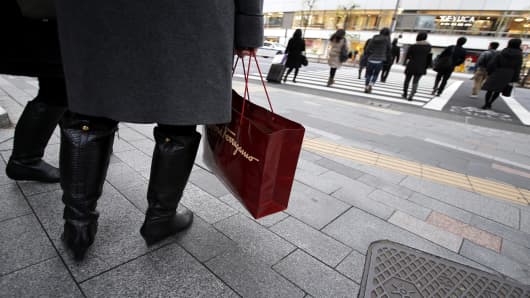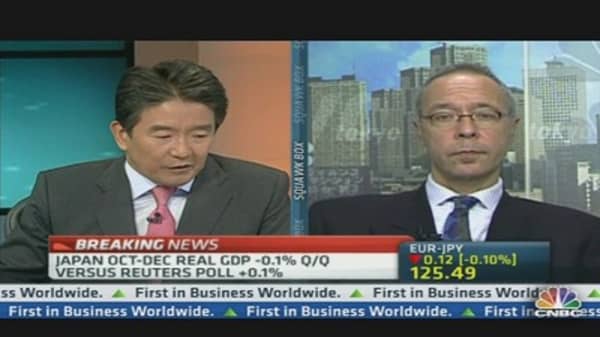Japan's core machinery orders unexpectedly jumped 2.8 percent in December, following a rise of 3.9 percent in November, data released last week showed. The numbers, while volatile, are seen as a leading indicator of capital spending in the months ahead.
A rise in sentiment indicators is another reason to be hopeful after Thursday's GDP data confirmed Japan's economy remains in recession, HSBC said.
Japan's service-sector sentiment index, for instance, rose in January for a third month running, according to a government survey released last week.
"Despite the gloomy (GDP) headlines, recent high-frequency data and sentiment indicators suggest that the worst is over for Japan's economy and we expect a return to growth in the first quarter of 2013," analysts at HSBC said in a note.
(Read More: Prologis CEO: Why We're Excited About 'Abenomics')
Upbeat BOJ
The Bank of Japan (BOJ) meanwhile on Thursday raised its assessment of the economy because of the yen's recent declines and signs of a recovery in global demand.
The central bank left its monetary policy unchanged at the end of a two-day meeting. The BOJ last month adopted a 2 percent inflation target, one of the bold measures it unveiled to push Japan out of deflation.
In a bid to revive Japan's economy and end two decades of deflation, Japan's Prime Minister Shinzo Abe plans to combine fiscal stimulus from the government with aggressive monetary easing. His economic policies, known as "Abenomics," have attracted much attention, mostly because of the impact they've had on Japan's yen, which has depreciated about 21 percent since mid-November- just before Abe came to power.
(Read More: Yen Tops List of Currency War Aggressors)
Japan's stock market has surged 30 percent in the past three months as the yen's weakness boosted the outlook for exporters. The positive wealth effect from a rallying stock market will have a knock on impact on GDP growth in the months ahead, analysts said.
(Read More: Nikkei Jumps After US 'Green Light' on Yen Selling)
Tony Nash, managing director at the consulting firm IHS, pointed to anecdotal evidence to show that Japan's economic prospects are turning around.
"I had to wait for the first time ever to get a seat at a cafe in Tokyo recently. That tells me people are going to Japan and checking it out and that's business people, not just tourists," Nash said on "Squawk Box." "This is what I call observational economics."
Thursday's GDP numbers only reinforced expectations for aggressive monetary easing, analysts said.
(Read More: BOJ Keeps Policy Steady, Ups Economic Outlook)
The break-down of the data showed, capital expenditure fell 2.6 percent, more than the median estimate for a 1.8 percent decline, marking the fourth straight quarter of decline.
"Japan has been in deflation was for so long, so it is about time someone woke up and did something about it and it does seem like that is happening now," said Nicholas Smith, Director and Strategist at CLSA in Tokyo. "The GDP numbers just make the case for doing that stronger."





